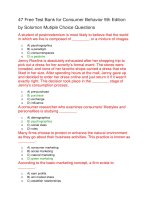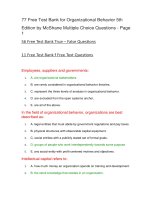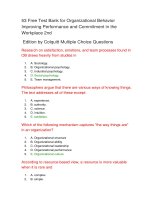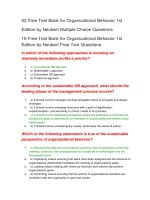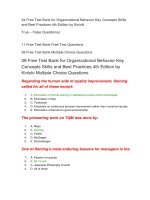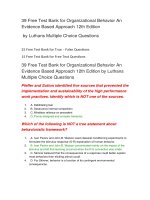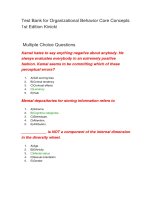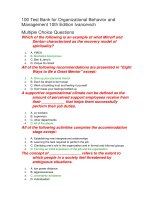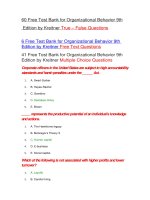101 test bank for organizational behavior improving performance and commitment in the workplace 3rd edition colquitt
Bạn đang xem bản rút gọn của tài liệu. Xem và tải ngay bản đầy đủ của tài liệu tại đây (131.76 KB, 21 trang )
Test Bank for Organizational Behavior Improving
Performance and Commitment in the Workplace 3rd
Edition Colquitt
Multiple Choice Questions
(p. 35) Which of the following behaviors involved in
adaptability deals with anticipating change in the work
demands and searching for and participating in
assignments or training to prepare for these changes?
1.
2.
3.
4.
5.
A. Handling work stress
B. Solving problems creatively
C. Dealing with uncertain and unpredictable work situations
D. Learning work tasks, technologies, and work situations
E. Demonstrating interpersonal adaptability
(p. 48) The management technique that assesses an
employee's performance by directly assessing job
performance behaviors is known as _____
1.
2.
3.
4.
5.
A. behaviorally anchored rating scales.
B. management by objectives.
C. 360 degree feedback.
D. behaviorally applicable rating scales.
E. 180 degree feedback.
(p. 38) _____ is defined as voluntary employee activities that
may or may not be rewarded but that contribute to the
organization by improving the overall quality of the
setting in which work takes place.
1.
2.
3.
4.
5.
A. Creative task performance.
B. Adaptive task performance.
C. Counterproductive behavior.
D. Citizenship behavior.
E. Routine task performance.
(p. 44) There is _____ correlation between task performance
and counterproductive behavior.
1.
2.
3.
4.
5.
A. a weak negative
B. a weak positive
C. a strong negative
D. a strong positive
E. no
(p. 39) James is a junior level manager with the Palm Green
Hotels. He is also a freelance journalist for a local
travel magazine. James keeps himself updated with
news about his company and always features the hotel
in his weekly columns. He promotes his hotel to such
an extent that the number of visitors to the hotel have
considerably increased. Which of the following
characteristics does James portray?
1.
2.
3.
4.
5.
A. Edginess
B. Political deviance
C. Sportsmanship
D. Civic virtue
E. Boosterism
(p. 36) Which of the following is wrong about job analysis?
1.
2.
A. The first step in job analysis is to generate a list of all job activities.
B. A subject matter expert is consulted regarding the frequency and importance of
all job activities.
3. C. Each activity is rated by subject matter experts, according to things like
importance and frequency of the activity.
4. D. Activities with the lowest ratings are used to define job responsibilities.
5. E. Job analysis is used by many organizations to identify task performance
behaviors.
(p. 46) Which of the following represents the bulk of the
service job growth in the United States?
1.
2.
3.
4.
5.
A. Maintenance workers
B. Repair sheet metal workers
C. Retail salespersons
D. Construction industry laborers
E. Production jobs
(p. 43) Which of the following behaviors is a type of minor
interpersonal counterproductive behavior?
1.
2.
3.
4.
5.
A. Sabotage
B. Harassment
C. Incivility
D. Substance abuse
E. Theft
(p. 47) Which of the following performance appraisal
systems refers to a philosophy that bases an
employee's evaluations on whether the employee
achieves specific performance goals?
1.
2.
3.
4.
5.
A. Behaviorally anchored rating scales
B. Management by objectives
C. 360 degree feedback
D. Benchmarking
E. Behavioral observation scales
(p. 34) Natalie, Rose, and Charlet contribute most directly to
the business goals of the Healthy White clinic through
their:
1.
2.
3.
4.
5.
A. creative task performance.
B. routine task performance.
C. interpersonal task performance.
D. intrapersonal task performance.
E. adaptive task performance.
(p. 42) All of the following are forms of counterproductive
behaviors EXCEPT:
1.
2.
3.
4.
5.
A. political deviance.
B. personal aggression.
C. property deviance.
D. production deviance.
E. aggressive training.
(p. 38) Interpersonal citizenship behaviors consist of all the
following EXCEPT:
1.
2.
3.
4.
5.
A. helping.
B. courtesy.
C. sportsmanship.
D. boosterism.
E. respect for others.
(p. 35-36) Riya has become famous creating new styles in
women's formal wear. Her assistants copy the patterns
created by Riya, cut cloth pieces and sew them into
garments that look like Riya's creations. The work
done by Riya is a type of _____ whereas the work done
by her assistants is a type of _____.
1.
A. routine task performance; creative task performance
2.
3.
4.
5.
B. creative task performance; counterproductive behavior
C. citizenship behaviors; counterproductive behavior
D. counterproductive behavior; creative task performance
E. creative task performance; routine task performance
(p. 42) Which of the following is a minor organizational
counterproductive behavior?
1.
2.
3.
4.
5.
A. Sabotage
B. Harassment
C. Incivility
D. Gossiping
E. Wasting resources
(p. 39) Some people react to bad rules or policies by
constructively trying to change them, instead of
passively complaining about them. This positive
characteristic refers to:
1.
2.
3.
4.
5.
A. helping.
B. sportsmanship.
C. voice.
D. civic virtue.
E. boosterism.
(p. 38) Interpersonal citizenship behavior includes:
1.
2.
3.
4.
5.
A. voice.
B. civic virtue.
C. sportsmanship.
D. boosterism.
E. secrecy.
(p. 42) Behaviors that intentionally harm the organization's
assets and possessions are referred to as:
1.
2.
3.
4.
5.
A. production deviance.
B. political deviance.
C. property deviance.
D. personal aggression.
E. organizational aggression.
(p. 42) Property deviance includes _____.
1.
2.
3.
4.
5.
A. interpersonal and organizational behaviors
B. sabotage and theft
C. gossiping and incivility
D. harassment and abuse
E. wasting resources and substance abuse
(p. 48) The _____ approach involves collecting performance
information not just from the supervisor but from
anyone else whomight have firsthand knowledge
about the employee's performance behaviors.
1.
2.
3.
4.
5.
A. behaviorally anchored rating scales
B. management by objectives
C. 360 degree feedback
D. behavioral observation scales
E. benchmarking
(p. 37) Which of the following statements about the O*NET is
false?
1.
2.
3.
4.
5.
A. It captures the "numerous small decisions" that separate the most effective
organizations from their competitors.
B. It is an online database.
C. It is involved in figuring out the important tasks for a given job.
D. It includes the characteristics of most jobs in terms of tasks.
E. It includes the required knowledge, skills, and abilities to perform a task.
(p. 39) Natalie's acts of attending events on behalf of Healthy
White, keeping abreast of dental regulations and
business-related news during her personal time refers
to:
1.
2.
3.
4.
5.
A. counterproductive behavior.
B. boosterism.
C. civic virtue.
D. sportsmanship.
E. voice.
(p. 38) The three hygienists' interact with one another in a
manner that reflects high levels of _____.
1.
2.
3.
4.
5.
A. boosterism
B. interpersonal citizenship behavior
C. routine task performance
D. adaptive task performance
E. centralized behavior
(p. 48) The short descriptions of effective and ineffective
behaviors used to create an employee performance
measurement instrument that managers can use to
evaluate employee behavior are referred to as _____.
1.
2.
A. 360 degree feedback
B. management by objectives
3.
4.
5.
C. critical incidents
D. descriptive events
E. favorable incidents
(p. 46) Historically, research on OB has focused on the _____
aspects of job performance.
1.
2.
3.
4.
5.
A. educational
B. knowledge
C. learning
D. physical
E. theoretical
(p. 46) Which of the following statements about knowledge
work is false?
1.
2.
3.
4.
5.
A. By the early 1990s, the majority of new jobs required employees to apply
analytical knowledge acquired through formal education and continuous learning.
B. The tools used to do knowledge work change quickly.
C. Statistics from the U.S. Department of Labor confirm the rise of knowledge
work.
D. Jobs involving cognitive activity are becoming more prevalent than jobs
involving physical activity.
E. Knowledge work tends to be less fluid and dynamic in nature than physical
work.
(p. 42) Which of the following is false about
counterproductive behaviors?
1.
2.
3.
4.
5.
A. People who engage in one form of counterproductive behavior also tend to
engage in other forms of counterproductive behavior.
B. Counterproductive behavior is relevant to any job.
C. There is a strong positive correlation between task performance and
counterproductive behavior.
D. Counterproductive behaviors tend to represent a pattern of behavior rather than
isolated incidents.
E. Sometimes the best task performers are the ones who can best get away with
counterproductive actions.
(p. 34) For a kindergarten teacher, assisting her students out
of a smoke-filled elementary school is an example of
_____.
1.
2.
3.
4.
5.
A. citizenship behavior
B. routine task performance
C. job dissonance
D. counterproductive behavior
E. adaptive task performance
(p. 41) Employee behaviors that intentionally hinder
organizational goal accomplishment are referred to
as:
1.
2.
3.
4.
5.
A. mistaken errors.
B. omissions.
C. erroneous identities.
D. counterproductive behavior.
E. counteractive mistakes.
(p. 49) Which of the following is NOT an element of GE
leadership according to Jack Welch's vitality curve?
1.
2.
3.
4.
5.
A. High energy levels
B. The edge to make tough yes-and-no decisions.
C. Ability to energize others
D. Desire to emulate
E. Ability to consistently execute and deliver on their promises
(p. 38) Don always maintains a good attitude with coworkers
even when the department goes through tough times.
Don's behavior is an example of:
1.
2.
3.
4.
5.
A. helping.
B. courtesy.
C. sportsmanship.
D. civic virtue.
E. boosterism.
(p. 39) Which of the following is an organizational citizenship
behavior?
1.
2.
3.
4.
5.
A. Civic virtue
B. Courtesy
C. Representing self-interests in a positive way to the public
D. Sportsmanship
E. Behaviors that benefit employees with excess workloads
(p. 48) The _____ approach uses critical incidents to create a
measure that can be used to evaluate employee
performance.
1.
2.
3.
4.
5.
A. management by objectives
B. 360 degree feedback
C. behaviorally anchored rating scales
D. benchmarking
E. behavioral observation scales
(p. 43) Which of the following occurs when employees are
subjected to unwanted physical contact or verbal
remarks from a colleague?
1.
2.
3.
4.
5.
A. Harassment
B. Abuse
C. Incivility
D. Production deviance
E. Boosterism
(p. 37) The electronic government database used to identify
the set of behaviors needed to define task
performance is known as the:
1.
2.
3.
4.
5.
A. behaviorally anchored ratings scale network.
B. employment analysis network.
C. occupational information network.
D. task performance analysis network.
E. job responsibilities network.
(p. 43) Which of the following behaviors are forms of
production deviance?
1.
2.
3.
4.
5.
A. Wasting resources and substance abuse
B. Sabotage and theft
C. Gossiping and incivility
D. Harassment and abuse
E. Interpersonal and organizational behaviors
(p. 39) Which of the following is false about interpersonal
behavior?
1.
2.
3.
4.
5.
A. A team whose members have good interpersonal behavior is likely to have a
positive team atmosphere.
B. Interpersonal behavior is most important when employees work in small groups.
C. Interpersonal behavior is most important when employees work in large groups.
D. Behaviors that commonly fall under the "teamwork" heading are examples of
interpersonal behavior.
E. Team members with good interpersonal behavior tend to work toward achieving
common goals.
(p. 43) Which of the following is a serious organizational
counterproductive behavior?
1.
2.
3.
4.
5.
A. Incivility
B. Wasting resources
C. Gossiping
D. Sabotage
E. Substance abuse
(p. 38) Citizenship behaviors can be divided into the two
main categories of:
1.
2.
3.
4.
5.
A. intrapersonal and organizational.
B. interpersonal and intrapersonal.
C. organizational and political.
D. interpersonal and political.
E. interpersonal and organizational.
(p. 42) Which of the following is a type of serious
interpersonal counterproductive behavior?
1.
2.
3.
4.
5.
A. Sabotage
B. Harassment
C. Incivility
D. Gossiping
E. Wasting resources
(p. 43) Behaviors that focus specifically on reducing the
efficiency of work output are known as _____.
1.
2.
3.
4.
5.
A. political deviance
B. property deviance
C. personal aggression
D. political aggression
E. production deviance
(p. 39) Which of the following citizenship behaviors does
Charlet exhibit?
1.
2.
3.
4.
5.
A. Voice
B. Feminism
C. Civic virtue
D. Boosterism
E. Political deviance
(p. 43) _____ is the most common form of production
deviance.
1.
2.
3.
4.
5.
A. Theft
B. Incivility
C. Wasting resources
D. Sabotage
E. Harassment
(p. 43) Behavior that involves verbal hostility and physical
altercations directed toward other employees is
referred to as _____.
1.
A. boosterism
2.
3.
4.
5.
B. incivility
C. personal aggression
D. sabotage
E. political deviance
(p. 47) Which of the following statements about management
by objectives (MBO) is false?
1.
2.
3.
4.
5.
A. It is a management philosophy that bases an employee's evaluations on
whether the employee achieves specific performance goals.
B. Employee involvement is high in MBO.
C. It is a set of mutually agreed-upon objectives that are measurable and specific.
D. It is best suited for managing the performance of employees who work in
contexts in which subjective measures of performance can be quantified.
E. Employee performance can be gauged by referring to the degree to which the
employee achieves results that are consistent with the objectives.
(p. 43) _____ represents communication that is rude,
impolite, discourteous, and lacking in good manners.
1.
2.
3.
4.
5.
A. Abuse
B. Incivility
C. Harassment
D. Property deviance
E. Gossiping
(p. 38) Which of the following behaviors benefits coworkers
and colleagues and involves assisting, supporting,
and developing other organizational members in a way
that goes beyond normal job expectations?
1.
2.
3.
4.
5.
A. Intrapersonal citizenship behavior
B. Interpersonal citizenship behavior
C. Organizational citizenship behavior
D. Production citizenship behavior
E. Political citizenship behavior
(p. 39) Delux Services was celebrating its operations in over
17 countries. Linda, a junior HR assistant, was
disinterested in attending this celebratory event. The
senior HR managers overheard Linda asking her
friends the reason for this party. Back at the office,
after a review, it was found that Linda never attended
any of the meetings with the local business heads. Her
lack of interest and knowledge about the company
would make her someone who displays _____.
1.
A. high self-esteem
2.
3.
4.
5.
B. low civic virtue
C. "A" player characteristics
D. wasting resources
E. positive boosterism
(p. 43) Which of the following occurs when an employee is
assaulted or endangered such that physical and
psychological injuries may occur?
1.
2.
3.
4.
5.
A. Boosterism
B. Sabotage
C. Incivility
D. Abuse
E. Gossiping
(p. 35) Adaptability involves all of the following EXCEPT:
1.
2.
3.
4.
5.
A. handling work stress.
B. solving problems creatively.
C. handling emergencies.
D. performing daily routine work.
E. responding to unpredictable demands.
(p. 43) Behaviors that intentionally disadvantage other
individuals rather than the larger organization are
referred to as _____.
1.
2.
3.
4.
5.
A. property deviance
B. organizational aggression
C. wasting resources
D. personal aggression
E. political deviance
(p. 42) Which of the following behaviors is a type of
production deviance?
1.
2.
3.
4.
5.
A. Wasting resources and substance abuse
B. Sabotage and theft
C. Gossiping and incivility
D. Harassment and abuse
E. Interpersonal and organizational behaviors
(p. 34) Dr. Doris contributes most directly to the business
goals of the Family Dentistry through:
1.
2.
3.
4.
5.
A. creative task performance.
B. routine task performance.
C. interpersonal task performance.
D. intrapersonal task performance.
E. adaptive task performance.
True - False Questions
(p. 36) Creative task performance is an expected behavior
limited to jobs such as artist and inventor.
1.
2.
True
False
(p. 36) The first step in conducting a job analysis is to
generate a list of all the activities involved in a job.
1.
2.
True
False
(p. 48) Very few 360 degree feedback systems ask the
employee to provide ratings of his/her own
performance.
1.
2.
True
False
(p. 43) Property deviance refers to behaviors that harm the
organization's assets and possessions.
1.
2.
True
False
(p. 33) Job performance is formally defined as the value of
the set of employee behaviors that contribute, either
positively or negatively, to organizational goal
accomplishment.
1.
2.
True
False
(p. 46) In addition to being more cognitive, knowledge work
tends to be more structured and static in nature.
1.
2.
True
False
(p. 43) Wasting resources is the most common form of
production deviance.
1.
2.
True
False
(p. 43) Personal aggression is defined as hostile verbal and
physical actions directed toward other employees.
1.
True
2.
False
(p. 37) O*NET captures the "numerous small decisions" that
separate the most effective organizations from their
competitors.
1.
2.
True
False
(p. 39) Organizational citizenship behaviors benefit the larger
organization by supporting and defending the
company, working to improve its operations, and
being especially loyal to it.
1.
2.
True
False
(p. 38) Courtesy refers to keeping coworkers informed about
matters that are relevant to them.
1.
2.
True
False
(p. 37) The O*NET is an online government database that
describes the results of task performance behaviors
that must be reported by firms to the government on
an annual basis.
1.
2.
True
False
(p.38) Citizenship behavior is defined as voluntary employee
activities that may or may not be rewarded.
1.
2.
True
False
(p. 43) Political deviance refers to behaviors that
intentionally harm the organization's assets and
possessions.
1.
2.
True
False
(p. 35) Creative task performance is the degree to which
individuals develop ideas or physical outcomes that
are both novel and useful.
1.
2.
True
False
(p. 38) The most valuable employees in any organization are
those who take extra efforts and perform tasks that
were previously unheard of.
1.
2.
True
False
(p. 44) There is a positive correlation between task
performance and counterproductive behavior.
1.
2.
True
False
(p. 38) Sportsmanship involves maintaining a good attitude
with coworkers, even when they've done something
annoying or when the unit is going through tough
times.
1.
2.
True
False
(p. 34) Task performance includes employee behaviors that
are directly involved in the transformation of
organizational resources into the goods or services
that the organization produces.
1.
2.
True
False
(p. 48) BARS emphasizes the results of job performance as
much as it does the performance behaviors
themselves.
1.
2.
True
False
(p. 47) The MBO approach involves collecting performance
information not just from the supervisor but from
anyone else who might have firsthand knowledge
about the employee's performance behaviors.
1.
2.
True
False
(p. 39) Interpersonal citizenship behavior is not important
when employees work in small groups or teams.
1.
2.
True
False
(p. 34) Adaptive task performance involves employee
responses to task demands that are novel, unusual, or,
at the very least, unpredictable.
1.
2.
True
False
(p. 43) Substance abuse is a form of political deviance.
1.
2.
True
False
(p. 51) Social networking sites and their applications can be
used to monitor employee performance.
1.
2.
True
False
(p. 49) According to Jack Welch's "vitality curve," the
employees are segregated into the top 30 percent, the
vital middle 60 percent and the bottom 10 percent
1.
2.
True
False
(p. 46) Service work involves direct verbal or physical
interactions with customers.
1.
2.
True
False
(p. 43-44) People who engage in one form of
counterproductive behavior do not usually engage in
other forms.
1.
2.
True
False
(p. 44) Sometimes the best task performers are also the
employees who engage in counterproductive
behavior.
1.
2.
True
False
(p. 47) Service work contexts place a greater premium on
high levels of citizenship behavior and low levels of
counterproductive behavior.
1.
True
2.
False
(p. 39) Boosterism involves speaking up and offering
constructive suggestions for change.
1.
2.
True
False
(p. 49) Despite its popularity, 360 degree feedback is not well
suited for developing employee talent.
1.
2.
True
False
(p. 33) Evaluating an employee's performance based on
results alone gives an accurate picture of which
employees are worth more to the organization.
1.
2.
True
False
(p. 34) Routine task performance involves employee
responses to task demands that are novel, unusual, or,
at the very least, unpredictable.
1.
2.
True
False
(p. 43) Gossiping represents communication that is rude,
impolite, discourteous, and lacking in good manners.
1.
2.
True
False
(p. 34) Task performance is the set of explicit obligations that
an employee must fulfill to receive compensation and
continued employment.
1.
2.
True
False
(p. 41) Counterproductive behavior is defined as employee
behaviors that unintentionally hinder organizational
goal accomplishment.
1.
2.
True
False
(p. 48) Feedback from BARS can help an employee develop
and improve over time.
1.
2.
True
False
(p. 49) According to Welch, C players are the backbone of the
company but lack the passion of the A players.
1.
2.
True
False
Free Text Questions
Define task performance and explain its dimensions.
Answer Given
Task performance includes employee behaviors that are directly involved in the
transformation of organizational resources into the goods or services that the
organization produces. Put differently, task performance is the set of explicit
obligations that an employee must fulfill to receive compensation and continued
employment. It includes: Routine task performance: These are well-known
responses to demands that occur in a normal, routine and predictable way. For
example, an accountant's job; Adaptive task performance: These are employee
responses to task demands that are novel, adaptive, unusual and unpredictable.
Examples could be handling emergencies and crises; Creative task performance:
is the degree to which individuals develop ideas or physical outcomes that are
both novel and useful. An example could be developing breakthrough products.
Define and analyze the importance of job performance also
state its elements?
Answer Given
Job performance is the value of the set of employee behaviors that contribute,
either positively or negatively, to organizational goal accomplishment. Job
performance elements include: Task performance: It is defined as employee
behaviors that are directly involved in the transformation of organizational
resources into the goods or services that the organization produces. Task
performance could be in the form of routine tasks, adaptive performance or
creative performance. Citizenship behavior: It includes voluntary employee
activities that may or may not be rewarded but contribute to the organization by
improving the team goals. Counterproductive behavior: Employee behaviors that
intentionally hinder organizational goal accomplishment come under this category
What is counterproductive behavior? What are the different
types of counterproductive behavior? Provide
examples of each.
Answer Given
Counterproductive behavior is defined as employee behaviors that intentionally
hinder organizational goal accomplishment. The four types include: • Property
deviance: This refers to behaviors that harm the organization's assets and
possessions. This could be in the form of sabotage, which represents the
purposeful destruction of physical equipment, organizational processes or
company products. Theft is another type of property deviance, which refers to the
intentional removal of an organization's tangible or intangible property; •
Production deviance: This focuses specifically on the reduction of the efficiency of
the work output. This could take the form of wasting resources. Wasting resources
is the most common form of production deviance, when employees use too many
materials or too much time to do too little work. Substance abuse represents
another form of production deviance. If employees abuse drugs or alcohol while
on the job or shortly before coming to work, then the efficiency of their production
will be compromised because their work will be done more slowly and less
accurately; • Political deviance: This refers to behaviors that intentionally
disadvantage other individuals rather than the larger organization. Gossiping:
casual conversations about other people in which the facts are not conformed as
true—is one form of political deviance. Such behaviors undermine the morale of
both friendship groups and work groups. Incivility represents communication that
is rude, impolite, discourteous, and lacking in good manners; • Personal
aggression: This is defined as hostile verbal and physical actions directed toward
other employees. Harassmentfalls under this heading and occurs when
employees are subjected to unwanted physical contact or verbal remarks from a
colleague. Abuse also falls under this heading; it occurs when an employee is
assaulted or endangered in such a way that physical and psychological injuries
may occur.
Describe some of the trends that affect job performance in
the contemporary workplace.
Answer Given
The kinds of jobs employees do are changing, as is the way workers get
organized within companies. These trends put pressure on some elements of job
performance while altering the form and function of others: • Knowledge work:
Today, statistics from the U.S. Department of Labor confirm that this type of work,
also called knowledge work, is becoming more prevalent than jobs involving
physical activity. In addition to being more cognitive, knowledge work tends to be
more fluid and dynamic in nature. These require employees to engage in cognitive
work, applying theoretical and analytical knowledge acquired through formal
education and continuous learning; • Service work: One of the largest and fastest
growing sectors in the economy is not in industries that produce goods but rather
in industries that provide services. Service work, or work that provides nontangible
goods to customers through direct electronic, verbal, or physical interaction,
accounts for a large part of the economic activity in the United States. Examples
would include retail jobs, customer service representatives, and food service
workers.
Ms. Kate is a very friendly and helpful person. She goes out
of her way to help her coworkers who struggle with
their tasks. Kate attends the optional meetings that are
scheduled for the employees. She also maintains a
good attitude with everyone even in trying times.
Which behavior relevant to job performance is Ms.
Kate demonstrating? Elaborate on this behavior and
its types with examples.
Answer Given
Ms. Kate is demonstrating citizenship behavior with her friendly and voluntary
activities. Citizenship behavior is defined as voluntary employee activities that may
or may not be rewarded but that contribute to the organization. The two types of
citizenship behavior are: • Interpersonal citizenship behavior: This includes all
those behaviors that benefit coworkers and colleagues. They involve assisting,
supporting, and developing other organizational members in a way that goes way
beyond normal job expectations. It includes helping, courtesy and sportsmanship;
◦Helping: assisting coworkers who have heavy workloads, aiding them with
personal matters, and showing new employees the ropes when they first arrive on
the job; ◦Courtesy: keeping coworkers informed about matters that are relevant to
them; ◦Sportsmanship: maintaining a good attitude with coworkers, even when
they've done something annoying or when the unit is going through tough times; •
Organizational citizenship behavior: This includes behaviors that benefit the larger
organization by supporting and defending the company, working to improve its
operations, and being especially loyal to it. This category includes voice, civic
virtue and boosterism; ◦Voice: speaking up and offering constructive suggestions
for change; ◦Civic virtue: participating in the company's operations at a deeperthan-normal level by attending voluntary meetings and functions, reading and
keeping up with organizational announcements, and keeping abreast of business
news that affects the company; ◦Boosterism: representing the organization in a
positive way when out in public, away from the office, and away from work.
Given the increase in service jobs, explain the implications
for job performance.
Answer Given
The increase in service jobs has a number of implications for job performance. For
example, the costs of bad task performance are more immediate and more
obvious. When customer service representatives do their job duties poorly, the
customer is right there to notice. That failure can't be hidden or corrected by other
employees chipping in before it's too late. In addition, service work contexts place
a greater premium on high levels of citizenship behavior and low levels of counter
productive behavior. If service employees refuse to help one another or maintain
good sportsmanship, or if they gossip and insult one another, those negative
emotions get transmitted to the customer during the service encounter.
Maintaining a positive work environment therefore becomes even more vital.
Explain the forced ranking method using Jack Welch's
"vitality curve."
Answer Given
Jack Welch's "vitality curve" forces managers to rank all of their people into one of
three categories: the top 20 percent (A players), the vital middle 70 percent (B
players), or the bottom 10 percent (C players). The A players are thought to
possess "the four Es of GE leadership." The B players are developed. According
to Welch, B players are the backbone of the company but lack the passion of As.
The C players are those who cannot get the job done and are let go. There are
some important controversies to consider. For example, some believe the system
is inherently unfair because it forces managers to give bad evaluations to
employees who may be good performers, just to reach a pre-established
percentage. As another example, employees may become hypercompetitive with
one another to avoid finding themselves in a lower category. This type of
competitiveness is the opposite of what may be needed in today's team-based
organizations.
Social networking applications can be used to monitor
employee performance. How true is this statement?
Explain with an example.
Answer Given
Social networking technology has recently been applied in organizational contexts
for the purposes of developing and evaluating employee job performance. It could
be used by employees to post and update weekly and quarterly goals, or to get
anonymous feedback from colleagues. There are some advantages to these types
of systems. They provide performance information that is much timelier, relative to
traditional practices that measure performance quarterly or even yearly.
Explain the importance of job performance and the basic
steps involved in job analysis.
Answer Given
Job analysis is a process used to identify task behaviors. It helps in deciding the
most important parameters for measuring employee performance. Although there
are many different ways to conduct a job analysis, most boil down to three steps.
First, a list of the activities involved in a job is generated. This list generally results
from data from several sources, including observations, surveys, and interviews of
employees. Second, each activity on this list is rated by "subject matter experts,"
according to things like the importance and frequency of the activity. Subject
matter experts generally have experience performing the job or managing the job
and therefore are in a position to judge the importance of specific activities to the
organization. Third, the activities that are rated highly in terms of their importance
and frequency are retained and used to define task performance. Those retained
behaviors then find their way into training programs as learning objectives and into
performance evaluation systems as measures to evaluate task performance.
Discuss briefly the four types of job performance
management techniques.
Answer Given
Four of the most representative practices used to manage employee performance
are: management by objectives, behaviorally anchored rating scales, 360-degree
feedback, and forced ranking. Management by objectives (MBO) refers to a
management philosophy that bases an employee's evaluations on whether the
employee achieves specific performance goals. Behaviorally anchored rating
scale (BARS) measure performance by directly assessing job performance
behaviors. The BARS approach uses critical incidents (short descriptions of
effective and ineffective behaviors) on a measurement instrument that managers
can use to evaluate employee performance. 360 degree feedback is a
performance evaluation approach that involves collecting performance information
not just from the supervisor but from anyone else who might have firsthand
knowledge (subordinates, peers, customers) about the employee's performance
behaviors. Forced ranking involves evaluations that make clear distinctions among
employees in terms of their job performance. Forced ranking refers to Jack
Welch's "vitality curve" that forces managers to rank all of their people into one of
three categories: the top 20 percent (A players), the vital middle 70 percent (B
players), or the bottom 10 percent (C players).

